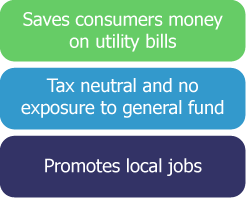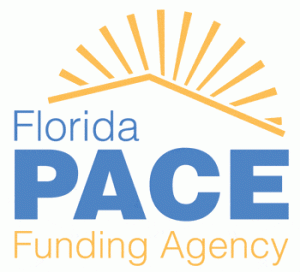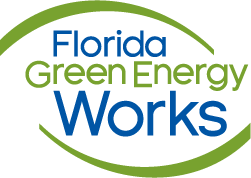|
Pace Programs
Solar Direct Participates in Property Assessed Clean Energy (PACE) Programs

What is PACE?
Property Assessed Clean Energy (PACE) is an innovative way to finance energy efficiency and renewable energy upgrades to buildings. Interested property owners evaluate measures that achieve energy savings and receive 100% financing, repaid as a property tax assessment for up to 20 years. The assessment mechanism has been used nationwide for decades to access low-cost long-term capital to finance improvements to private property that meet a public purpose. By eliminating upfront costs, providing low-cost long-term financing and making it easy for building owners to transfer repayment obligations to a new owner upon sale, PACE overcomes challenges that have hindered adoption of energy efficiency and related projects in our nation’s buildings.
PACE is a local government/community initiative that creates permanent private sector jobs, strengthening our national and local economies. Buildings use nearly half of the energy we consume in the United States. PACE programs help make our nation more energy independent and secure while safeguarding our environment by reducing demand for fossil fuels. The PACE financing mechanism provides a strong credit that is attractive to private sector investors and without government subsidies. PACE is voluntary. Property owners, acting in their own self interest, implement building upgrades that can save them money, increase the value of their property. PACE programs add value, and have gained bi-partisan support nationwide at federal, state and local levels.
Introduced in pilot programs in 2008, PACE made immediate sense to energy efficiency advocates across the country, and today, 28 states and the District of Columbia have adopted (or already had) legislation that enables local governments to offer PACE benefits to building owners. PACE is available for residential and commercial buildings.
Benefits of PACE
PACE drives spending in the local communities through the installation of energy efficient equipment and the implementation of renewable energy measures. Major benefits of PACE are:

Both commercial and residential PACE improve consumer’s cash flow by decreasing energy needs and hence decreasing utility bills. PACE, compared to other retrofit mechanisms, is tax neutral and results in no exposure to county’s general fund. An economic study performed by ECONorthwest in 2011 predicts that every $1 million of EE/RE project spending results in $2.5 million in total economic output, roughly $250 thousand in state and local taxes, and approximately 15 new jobs nationwide. Another study conducted in 2011 by the United States Department of Energy on the economic impacts of the Boulder County (CO) Climate Smart (PACE) Loan Program found that $9 million spent on EE/RE projects on 598 homes contributed, statewide, to more than $7 million in personal income gains, just under $30 million of total economic activity, and the creation of roughly 125 short-term jobs.
How does PACE Work?
There are 4 simple steps to every PACE programs:

PACE uses the same kind of land‐secured financing districts that American cities and towns have used for over 100 years to pay for improvements in the public interest. Over 37,000 land secured districts already exist and are a safe and familiar tool of municipal finance for street paving, parks, open space, water and sewer systems, street lighting, and seismic strengthening, among others.
PACE Programs
PACE programs work at the local municipal level and program elements vary to meet the needs of individual communities and reflect differences in state laws. Most PACE programs will share basic features:
- State and local governments establish, in law or public policy, a specific goal or objective: promoting energy efficiency as a means to promote jobs or better air quality, for example.
- A municipal government may establish a type of land or real property secured benefit district.
- Property owners within the district (or the municipality if a district is not required) can voluntarily choose to participate; those who choose not to see no change to their taxes and assessments.
- An experienced contractor will assess the scope of desired improvements. This may involve a thorough energy audit for efficiency measures and their projected savings and costs, or cost estimates for renewable projects weighed similarly against projected energy savings.
- The municipality will provide financing for the project, typically by selling bonds secured solely by payments made from participating property owners.
- Homeowners who receive a financing benefit from the municipality will agree to accept a property tax assessment or charge for up to 20 years, though shorter periods may be chosen or required by the
municipality.

|
PACE Programs in Florida

Clean Energy Green Corridor, Miami-Dade
Ygrene Energy Funds announcement with Carbon War Room last fall of a program centered initially in South Florida has led to the formation of the Clean Energy Green Corridor District. Initiated by the Town of Cutler Bay, the District to date includes Miami, South Miami, Pinecrest, Palmetto Bay, and Miami Shores, communities that total about 650,000 people. The Green Corridor District plans to offer both commercial and residential PACE financing, though only commercial projects will be permitted in the City of Miami.
Ygrene Energy Fund Florida, a subsidiary of the California based leader in PACE program development, will administer the program, using its turnkey approach that provides administration, financing, contracting, and a range of assurances and performance guarantees to participating governments. According to Ygrene’s John Wakefield, the implementation process has been launched with initial project finance and property improvements expected this fall for likely completion in early 2013. Ygrene reports that it has secured funding through Barclays and is working to develop potential funding from other lenders capable of warehousing assessments.
In Miami-Dade, Ygrene uses a comprehensive marketing strategy that involves broad outreach to local stakeholders through workshops, newsletters, and presentations. As John Wakefield informs us, in every clean energy district Ygrene establishes an Energy Center to showcase new equipment and technology, offer assistance and resources to local property owners, and undertake contractor recruitment, training and certification. Building on the experience of the Sonoma County Energy Independence program, Ygrene developed its direct advertising efforts consisting of media ads, direct mailing, and community events to better reach local property owners. Overall, Ygrene puts emphasis on creating localized programs at a District level.
As for energy audits, Green Corridor uses home evaluation software tool to prioritize improvements and calculate the SIR (savings to investment ratio). Water conservation and wind hazard abatement projects could be offered to Green Corridor participating municipalities that choose to include these measures when they join. Green Corridor will not require consent from existing mortgage lenders, relying on Florida’s enabling statute requirements for notice only.

Florida PACE Funding Agency Program
The Florida PACE Funding Agency garnered plenty of attention when it received validation for up to $2 billion in bond financing last fall. Kissimmee, a city in central Florida and Flagler County on the Atlantic coast are the original incorporators for the Agency, to which other local governments will “subscribe” to join. Again, under authority established by Section 163.01, F.S. the Agency will provide services to its subscribers and can levy assessments as repayment for PACE funded projects. Bryant, Miller & Olive (BMO), a prominent Florida based law firm, was instrumental in forming the program, and has been engaged by the Agency as its special counsel and bond counsel. Energy, Environment & Infrastructure LLC (a subsidiary of Science Applications International Corporation “SAIC”) was selected to be the third party administrator. The Agency is still in discussion with several providers of financial services. Bob Reid of BMO believes financing may ultimately be in the form of a warehouse facility that makes project funding available whenever it is needed.
The judgment of the Florida Circuit Court of Leon County on validation is binding on all parties in Florida, and it provides a judicial finality to the question of whether a local government has the authority to impose its PACE assessments. The $2 billion funding target could be achieved, according to Reid, if just 5% of 20-year-old residential and commercial buildings in the state participate in the program with an average project amounting to $15,000. Validation of the Florida PACE Funding Agency’s program does not extend to the Green Corridor or Florida Green Energy Works programs, which will have to seek validation of their individual programs.
Florida PACE Funding Agency plans to offer PACE for energy efficiency and renewable energy projects to both residential and commercial properties. Presumably, the decision to offer PACE to homeowners will need to be approved at the municipal level for local governments that subscribe to the Agency. Needless to say, it will be interesting to see how those local governments choose to proceed, and how mortgage lenders will react, given the FHFA’s edict that Fannie Mae and Freddie Mac cannot underwrite mortgages or refinance properties with PACE assessments.
Regarding commercial PACE, the Agency will base its requirements on Florida law that does not require consent from existing mortgage lenders for projects that represent less than 20% of the property’s appraised value (Florida law does require consent for projects in excess of 20%). According to Reid, the Florida PACE law passed after substantial engagement with the Florida Bankers Association and individual lenders. Therefore, the Agency will follow the law and provide a 30 day notice to existing lenders to present them with an opportunity to adjust/impose monthly tax /insurance /escrow payments. The agency will not require energy audits, however, interested property owners can get energy audits through qualified auditors.
Florida PACE Funding Agency is in the process of choosing a financial provider at their board meeting. There is an expectation to issue a $20 bond at the end of December.

Green Energy Works Program - For Commercial Systems
Florida Green Energy Works is administered by EcoCity Partners, L3C, a Florida low profit, limited liability corporation. The Towns of Lantana and Mangonia Park, both in Palm Beach County, recently joined to incorporate the Florida Green Finance Authority, the “separate legal entity” which any municipality or local government in Florida can join by interlocal agreement to scale the consortium. the program has launched and the website is accepting electronic applications in participating municipalities.
Florida Green Energy Works is focused on commercial PACE. While the program is equipped to offer both residential and commercial financing, at this point, residential funding is not being offered, due to the uncertainty created by the FHFA.
The program uses the “owner-arranged/open market” funding model and requires commercial property owners to provide notice and receive consent for the PACE assessment from their existing mortgage lender. When consent is obtained for a project, any market-based financing could be obtained. In other words, property owners can use any lender/ funding source, which open market advocates believe will induce competition and ultimately result in a lower interest rates and closing costs. EcoCity Partners is working with property owners and providers of funding to match the need with supply. The program expects to conclude its bond validation process by the end of the year.
Wind hazard abatement and water efficiency measures are an integral component of the program that will be available for local governments joining Florida Green Energy Works Program. Erin Deady, a lawyer active in developing Florida Green Energy Works and working with Leon County on the FHFA federal litigation, identifies the significant amount of data showing the linkage between water and energy efficiency improvements as justification for using PACE.
Florida Green Energy Works requires an energy savings audit completed by a qualified energy auditor or a certified building energy rater. At a minimum, this audit will include the following information:
- Recommendations for energy savings measures;
- Estimated energy savings and a priority ranking for each measure;
- Estimated renewable energy to be produced;
- Estimated greenhouse gas reductions; and
- Estimated cost savings resulting from the implementation of the recommendations and use of funds made available by the District.
A web based platform will collect and make data related to projects’ energy savings and environmental impacts (carbon reductions) readily available to the public.
 Florida Green Energy Works Florida Green Energy Works
Source: http://pacenow.org
For more information, please contact us
|
|